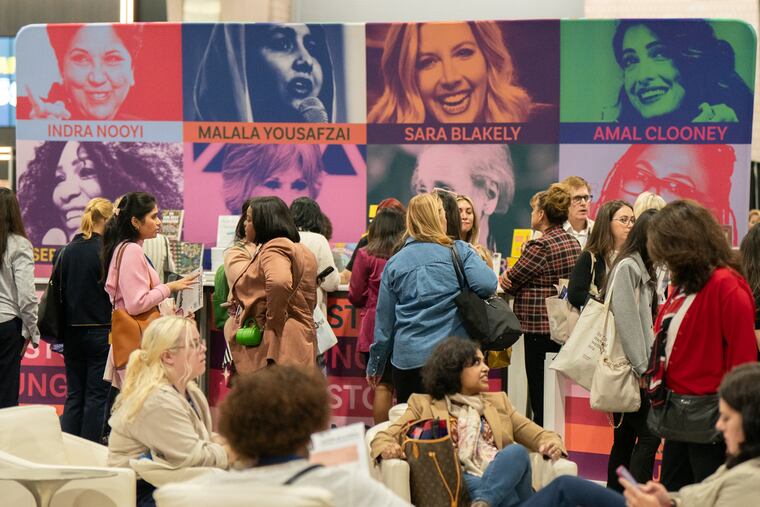While the mood outside was dour, attendees at the annual Pennsylvania Conference for Women gamely tried to stick to the program
A sea of professional women came to Philly two days after the election — not that they discussed it much.

Two days after a seismic election that many saw as a referendum on gender progress in the United States, 9,000 women descended on the Convention Center for the annual Pennsylvania Conference for Women.
Sponsored by Merck, the nonpartisan leadership workshop was filled with vendors, seminars, and speakers promising to promote women “in the workplace and beyond,” featuring sessions on shifting careers, navigating work-life balance, and mastering money.
Outside, the mood among many Philadelphians was dour. While Kamala Harris won the city with nearly 80% of the vote, Donald Trump did better here than in 2016 and 2020 and won the state and the country handily. Exit polls revealed stark divisions between women along race and class lines, and a sense of uncertainty about what might come next, politically and economically, hung in the air.
But the theme of the day was “Power in Unity,” and inside, a sea of professional women attempted to control what they could. When pressed, some expressed disappointment and fear about what a Trump presidency might hold, but at other moments, it was as if the election simply had not occurred.
From the start, Robin Arzón, head instructor at Peloton and the first keynote speaker of the day, set the tone. The closest she came to addressing politics was a brief acknowledgment of “all the stuff in the air, so many feelings, so much, headlines, it’s a lot,” before launching into a motivational speech about the power of self-talk.
Of course, in an alternate universe, perhaps attendees would have celebrated the election of the first female president and the shattering of one of the most enduring glass ceilings on this Thursday in November. Instead, they listened to inspirational, nonpartisan speeches by Diana Nyad and Sheryl Lee Ralph and bought silk scarves and beauty supplements. There was a long line for the gin tasting.
“We are keeping it very neutral today, focused on the unity,” said LaRhonda Green, 34, who works at Merck, as she took photos in the exhibit hall with her sister and a former colleague. It was a tough week, Green said, in which people were forced to “face a reality that women come second,” but the gathering still left her feeling motivated.
Green’s sister, Ragine Williams, 30, does DEI reporting, recruiting, and outreach for the technology firm SEI. She agreed that coming together with other women was inspiring, even if some may have voted for a president and a party that campaigned on dismantling diversity, equity, and inclusion initiatives like the one she runs.
“I might not have a job soon, but you know!” Williams said with a laugh.
Exit polls, which are not definitive but offer estimates to explain how people voted, show that women are not politically united.
A majority, or 53%, of white women voted for Donald Trump this year, according to an AP survey of 120,000 voters nationwide, while 89% of Black women and 60% of Latino women supported Kamala Harris. College-educated white women voted for Harris, while non-college-educated white women voted for Trump, according to an NPR analysis of exit polls.
It required, then, significant effort to keep the conference focused on “inspiration, hope, some much-needed joy,” as the conference’s executive director, Jess Black, put it in an interview.
“We didn’t fully appreciate what that was going to entail, and just what a delicate time it is, and how to navigate a lot of the complexities, especially as a nonprofit, nonpartisan organization,” Black said. She referred, somewhat obliquely, to avoiding “hot topics.”
Throughout the day, a series of prominent women speakers did just that. Mayor Cherelle L. Parker, in her first public comments after the election and despite her party suffering bruising losses nearly everywhere, stuck to the women’s empowerment theme. She thanked the “village of successful, intelligent, and compassionate women” who helped her along the way, and she led the hall in a chant of “One Philly, a United City.”
The only indication that anything was amiss was her exit song, Taylor Swift’s “I Can Do It With a Broken Heart,” an upbeat anthem about continuing to put on a show when you’re miserable.
Elsewhere, the vexing issues related to gender that so polarized voters on the campaign trail — abortion and pregnancy, access to fertility treatments, soaring childcare costs, childless women’s role in society, trans people’s access to health care and competitive sports, the final unshattered glass ceiling of the presidency — mostly went unmentioned.
“Politics is very triggering for people, so it’s probably best to not really address it,” said Aimee Riley, 52, an account manager for the energy company CPower.
Some sought a silver lining in the results.
“Sometimes a loss is not really a loss!” said Brigitte Broome, 59, about Harris’ defeat, as she made her way to a women’s entrepreneurship session. Harris, she said, “set a really great example for women” and was probably inspiring some young women right now.
For others, the relentless focus on the individual, on the power of a positive mindset and a resilient spirit, didn’t quite match what had just happened outside the conference walls.
“Nobody’s acting like the world is on fire,” said Fatimah Conley, a lawyer from Delaware, as she surveyed the crowd of women in blazers walking by. “It’s foolishness!”